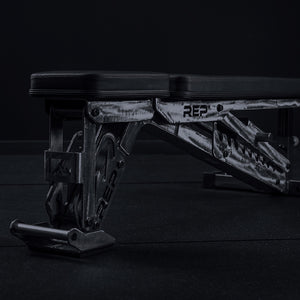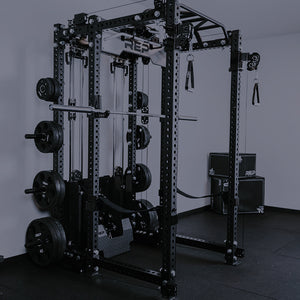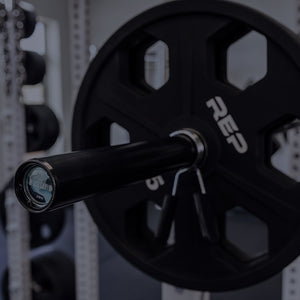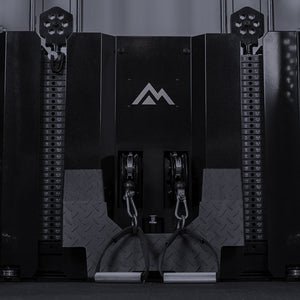
Cassandra Concepcion earned her pro card at her second ever Strongman competition in 2020. Two months later, she was crowned the 14th strongest woman in the world – at age 23, the youngest competitor on the field at that time.
Today, Concepcion is a lightweight pro Strong(wo)man and was America’s strongest woman under 64kg in 2021.

As her strength sports career continues to grow, she recently acquired a small studio that she’s transforming into her first personal gym. Since size is limited and she’s starting from scratch, she says she must prioritize the most important equipment first, and then build out from there.
A Strongman gym is a lot less particular than a competitive powerlifting gym, and it’s a ton simpler than a bodybuilding gym, she says. Here are the pieces of equipment she recommends.
Top 7 Pieces of Equipment for a Strongman Gym
“Really, you can train Strongman with a rock in your front yard,” says Concepcion. But if you want to train strategically, you want to make sure your home gym prepares you for the five typical events at a Strongman show: an overhead press, deadlift, moving event, medley, and some type of holding/grip event.
With home gyms on her mind, here are Concepcion’s top seven items you need to build a basic, at-home Strongman gym.
1. A YOKE
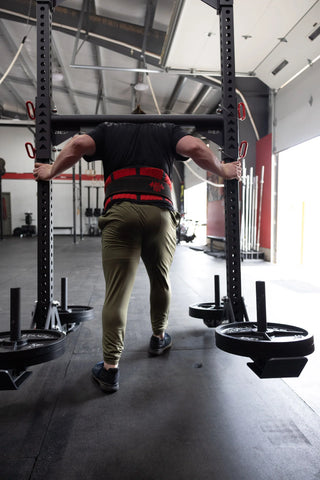
Concepcion starts with a yoke. First, because it’s her favorite event ever. Second, because yokes are incredibly versatile. Beyond yoke runs, you can also use a yoke to pass a sandbag over. The Oxylus™ yoke also transforms into a deadlift carry, a sled, and a squat rack. It hits so many Strongman exercises in one piece.
“If you’re in Strongman and you’re going to buy a rack, you may as well just buy the yoke,” she says. “You can have it all in one and save some money.”
2. A BARBELL AND PLATES

Second on Concepcion’s Strongman list is a barbell and plates.
“At America’s Strongest Woman, I expected iron plates and walked in to find kilo plates,” she says. “The beauty of Strongman is you train on whatever you have, and if you’re strong, it’ll translate over.”
You also need a barbell to train your deadlift, she says.
3. BANDS

“Sometimes we want to work the lockout and do reverse banded deadlifts for that,” she says. “What you use bands for depends on your weaknesses.”
4. AXLE BAR

The Axle Bar is critical for a Strongman gym, Concepcion says. An Axle Bar is thicker, shorter, and lighter (unloaded) than a regular bar. It’s 2” thick, 5’ or 7’ long, and weighs 17 or 22lbs, depending on the bar you choose. By comparison, the Basic Barbell is 1.2” thick, 7.3’ long, and weighs 44.1lbs.
“Not a lot of events have a regular barbell, other than deadlift. But the press will always be an axle bar,” she says.
An OHP with an axle bar requires a different position than a regular barbell. You can wrap your hands all the way around a regular bar, but an axle demands a different grip; most Strongman leave their thumbs on the outside of the axle when pressing, which changes the wrist positioning, Concepcion says. The fatter width is also great for improving your grip strength.
A meet may also include an axle deadlift, which is different than a regular deadlift in that the bar has no give.
“You can have a 600-pound deadlift and jump on an axle bar and barely pull 500 off the floor. It can be a shocking switch,” she says. “If there’s only one piece to buy and you’re on a budget, the axle bar is the one.”
5. FARMER'S WALK HANDLES

Farmer’s Walk Handles are also a big part of a Strongman gym; nearly every competition has a frame or farmer’s carry. While the yoke can transform into handles for carries, it’s slightly different.
Farmer’s Walk Handles are slightly thicker than a Basic Barbell and elevated for easy access. Each handle weighs 23lbs and is 63” long, rated for 450lbs per handle, or a 900lbs total carry. Do heavy holds with them or take them outside for sprints.
6. SANDBAGS
You’re also going to want sandbags to practice for carry events. REP carries two types of sandbags:
Stone Sandbags are used to train stone carries (as well as cleans, presses, and squats).
Regular Sandbags are ideal for odd-object challenges. They have seven different built-on handles reinforced by rivets.

“You can do just about anything with a sandbag,” Concepcion says.
While you could train carries with a big rock in your front yard, as Strongman grows, increasingly more comps are no longer using stones because they can damage floors -- and not all facilities allow them. Nylon bags are replacing stones at meets, Concepcion says.
She recommends getting a lighter bag for rep work and a heavier bag for load work. Sandbags come in four sizes, from small to XL, and you can adjust their weight based on how much sand you put into the filler bags. Small ranges from 5-25lbs; medium is 25-75lbs; large is 50-125lbs; and XL spans 125-200lbs.
7. SWISS BAR

The log press is another common Strongman event, but if you don’t have access to a log, you can train with a Cambered Swiss Bar, Concepcion says. The multiple grip options on the Swiss bar allow you to work your neutral-grip press, which mimics the shoulder and arm positioning of a log press. Concepcion says she also uses a Swiss bar for floor presses and overhead presses with a band.
All handles on the Cambered Swiss Bar take advantage of the camber, which offsets the weight from your grip. This creates a pendulum effect, so you have to engage more muscles to stabilize the bar, creating a different stimulus than a traditional barbell. The outermost handle is set at a deficit, so you can pull the bar into a deeper range of motion.
OTHER ADD-ONS
After you build out the seven most important pieces of an at-home Strongman gym, you can always continue to add more. Here are some other items Concepcion recommends as your gym grows:
Dumbbells and kettlebells: If you don’t have access to a Strongman-specific circus dumbbell, you can train with a regular dumbbell or a kettlebell. Try a kettlebell overhead press, keeping the bottom of the kettlebell to the ceiling to feel like the wobbly, unstable challenge of pressing a circus dumbbell.
Sled: If you don’t get a yoke that converts into a sled, you’ll want a separate Pull Sled to practice truck and sled pulls.
Cannonball Grips: Add an extra grip challenge to your pull-ups with these sphere-shaped grips. You can also attach them to kettlebells, dumbbells, or barbells to train grip strength while doing other exercises.

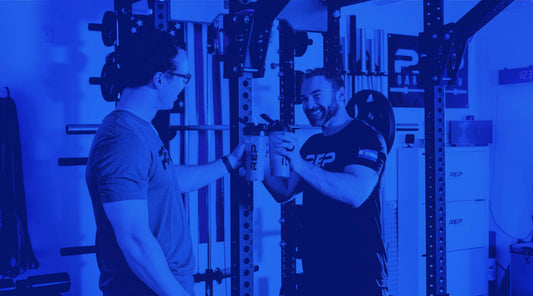
NEWSLETTER SIGNUP
Product launch information, promotions, blogs, and REP news.

